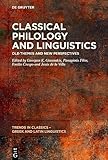Classical Philology and Linguistics : Old Themes and New Perspectives / ed. by Georgios K. Giannakis, Panagiotis Filos, Emilio Crespo Güemes, Jesús de la Villa.
Material type: TextSeries: Trends in Classics – Greek and Latin Linguistics ; 1Publisher: Berlin ; Boston : De Gruyter, [2023]Copyright date: ©2023Description: 1 online resource (XVIII, 692 p.)Content type:
TextSeries: Trends in Classics – Greek and Latin Linguistics ; 1Publisher: Berlin ; Boston : De Gruyter, [2023]Copyright date: ©2023Description: 1 online resource (XVIII, 692 p.)Content type: - 9783111272740
- 9783111273006
- 9783111272887
- 930
- online - DeGruyter
- Issued also in print.
| Item type | Current library | Call number | URL | Status | Notes | Barcode | |
|---|---|---|---|---|---|---|---|
 eBook
eBook
|
Biblioteca "Angelicum" Pont. Univ. S.Tommaso d'Aquino Nuvola online | online - DeGruyter (Browse shelf(Opens below)) | Online access | Not for loan (Accesso limitato) | Accesso per gli utenti autorizzati / Access for authorized users | (dgr)9783111272887 |
Frontmatter -- Preface -- Contents -- List of Figures and Diagrams -- List of Tables -- Abbreviations -- By Way of an Introduction: “(Historical) Linguistics and/or (Classical) Philology” -- Part I: Greek Language and Linguistics -- Early Greek Poetry and Linguistics -- Pindar’s Genius or Homeric Words? – The Interplay of Synchronic and Diachronic Analysis in Greek Philology and Linguistics -- Homeric Enjambment (and Caesura): A Functional-Cognitive Approach -- Old Morphology in Disguise: Homeric Episynaloephe, Ζῆν(α), and the Fate of IE Instrumentals -- “Not According to our Usage…”: Linguistic Awareness in Hellenistic Editorial Practice on Homer -- A Song of Milk and Honey: The Poetic Transformation of an Ancient Ritual Drink in Pindar -- The Greek Augment: What this Amazingly Enduring Element Says about Continuity in Greek -- At the Crossroads of Linguistics and Philology: The Tmesis-to-Univerbation Process in Ancient Greek -- Syntax, Semantics and Pragmatics -- Ideological Change and Syntactic Change in Ancient Greek: The Case of ἄτη and τύχη -- Syntactic Markedness and Stylistic Refinement: ‘Proleptic’ and ‘Resultative’ in Ancient Greek -- Girl, Υou’ll Be a Woman Soon: Grammatical Versus Semantic Agreement of Greek Hybrid Nouns of the Mädchen Type -- The Expression of Authority and Solidarity: ἡμεῖς in Place of ἐγώ in the Iliad -- A First Approach to Irony in Greek Oratory -- Comparative, Diachronic and Lexicographical Studies -- Greek Numeral System and Language Contacts in an Archaic Native Settlement of Southern Italy -- Non-Attic Vocalism, Epichoric Forms, and Attic Poetic Traditions -- Ἀμόργινος and ἀμοργίς: The Color of Olive Oil Lees and Aristophanes, Lysistrata 150 and 735, 737 -- Some Remarks on Ancient Epirote Glosses -- Greek Papyri and Corpora -- A Typology of Variations in the Ancient Greek Epistolary Frame (I–III AD) -- Transposition of Nominal and Verbal Bound Morphemes: The Case of -ες and -ας in Greek Documentary Papyri -- Some Aspects of Irrealis and the Usage of ἄν in Post-Classical Greek -- Part II: Latin Language and Linguistics -- Various Issues in Latin Linguistics -- Varro’s Etymological Theory and Practice -- An Interplay of Approaches in the Editing of a Late Latin Medical Translation -- Towards a Unified Account of the ab urbe condita Construction in Latin and Ancient Greek -- Latin Linguistics and Neronian Pastoral Revisited -- Linguistics, Philology and Christian Latin -- New Concepts in Ancient Languages: Greek and Latin (and beyond) in the First Christian Letters -- Searching for Order in the Rule: The Contribution of Philology and Linguistics to the Study of Saint Benedict’s Latin -- List of Contributors -- General Index -- Index Locorum
restricted access online access with authorization star
http://purl.org/coar/access_right/c_16ec
There is a long-standing debate over the relation of historical linguistics and classical philology, especially within the purview of the renewed interest in it during the last decades and the recent trends that characterize philological and linguistic studies. Ever since its appearance in the nineteenth century, the history of this debate testifies to a turbulent coexistence and fertile collaboration of the two disciplines, but at times also moving along centrifugal paths. The essays in this volume address this debate and cover various aspects of linguistic and philological research of Greek and Latin, moving in the middle ground where language, linguistics and philology crosscut and cross-fertilize each other highlighting the application of linguistic theory to the study of classical texts and drawing on fields such as syntactic theory and pragmatics, historical semantics and the lexicon, reconstruction and etymology, dialectology, editorial practices, the use of corpora, and other interdisciplinary approaches that function as hinges between philology and linguistics.
Issued also in print.
Mode of access: Internet via World Wide Web.
In English.
Description based on online resource; title from PDF title page (publisher's Web site, viewed 02. Jun 2024)


